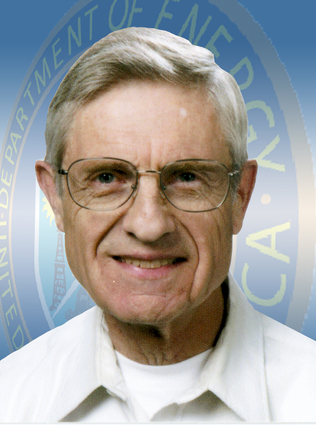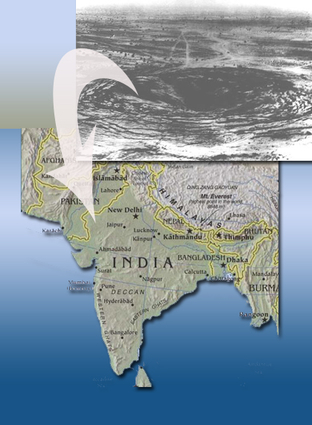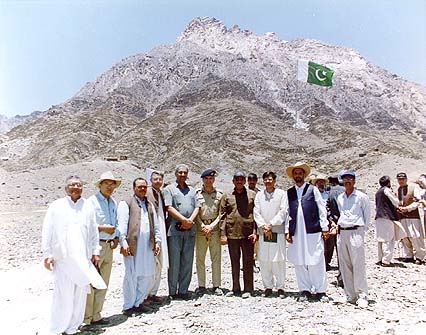In final analysis, Mackie's work is exceptional
The Indian subcontinent has long been a land of mystery to most of the Western world. It is home to towering mountains and ancient religions, stunning beauty and staggering poverty. It also is home to a dangerous nuclear arms race.
With China to the east, Afghanistan to the west and Russia to the north, the geopolitical dynamics of the region are extremely complex. Introduce nuclear weapons into the equation, and the situation could get very tense extremely fast.
Thus, it is no surprise that understanding India and Pakistan and their nuclear weapon programs has been an important focus of U.S. intelligence analysis. And Lawrence Livermore is home to one of the nation's foremost team of experts in this field.
One member of this team, Fred Mackie, a proliferation analyst in Z Program/Z Division for 30 years, was recently honored with the Department of Energy Secretary's Exceptional Service Award in recognition of his three decades of "exceptional leadership and timely and insightful analyses of nuclear proliferation developments in South Asia."
Although he retired in 2007, Mackie still comes in to the office several days a week as a fixed-time retiree to work on special projects. He also continues to mentor younger analysts and to pass on his knowledge of the Indian and Pakistani nuclear programs.
Mackie joined the Lab's Z Division in 1978 after completing a post-doctoral fellowship at Northwestern University. With a Ph.D. in physics from the University of Illinois and a six-year stint in the U.S. Navy under Adm. Hyman Rickover (considered the father of the nuclear navy), he was well suited to the world of proliferation analysis.
"Even before I came to Livermore I knew a bit about South Asia," Mackie recounted. "I remember talking with a postdoctoral colleague in 1978 about Indira Gandhi, who had recently lost an election and been forced out of office as India's prime minister. I predicted that she'd be back in 18 months or so. She was back in power in January 1980.
"Z Division in those days was an exciting place. We could be fairly self-directed and work on issues and topics that looked interesting and important." Mackie noted.
India and Pakistan clearly fit that bill. The two countries had been arch rivals ever since the British partitioned the subcontinent, with Pakistan feeling threatened by a much-larger India and India feeling disrespected and, since 1964, threatened by a nuclear-armed China. Both countries consequently sought powerful allies — China and the United States by Pakistan and the Soviet Union by India.
When asked if he was surprised in 1998 by India's and Pakistan's nuclear tests, Mackie said he was not surprised that they tested but was surprised by the timing.
"We knew for many years that both countries had nuclear weapon programs," he explained. Both acquired nuclear technology in the 1950s through the Atoms for Peace program, and India conducted its first test in 1974. Pakistan launched its nuclear weapon program after the 1971 war with India and the loss of East Pakistan, which became Bangladesh.
"The U.S. had fairly good relations with Pakistan in the 1970s and had the Soviets not invaded Afghanistan in 1979, it's possible that Pakistan's program could have been stopped. But then the United States needed Pakistan as an ally to offset Soviet influence in the region and Pakistan needed nuclear weapons to deter India, and the rest is history."
In reflecting on his career in Z Program/Z Division, Mackie commented on Livermore's unique approach to proliferation analysis. "We're the only place that pulls together analysts from multiple fields — physics, chemistry, engineering, materials science, computations, weapons design, political science — to work as a team.
"Proliferation analysis is puzzle-solving," Mackie said. "You have a handful of pieces of a jigsaw puzzle and you try to describe what the whole thing looks like."
He also noted that LLNL's distance from Washington D.C., is a distinct advantage. "We're not consumed by the day-to-day crises so we can look at the big picture. We've been able to undertake long-term analysis, following a country for many years, and this has led to several successes."
In addition to his analytical work at Livermore, Mackie has contributed his expertise to several books about India, including "India's Emerging Nuclear Posture: Between Recessed Deterrent and Ready Arsenal" by Ashley J. Tellis, and "India's Nuclear Bomb: The Impact on Global Proliferation" by George Perkovich.
Although Mackie has visited the Indian subcontinent seven or eight times during his career, he has never traveled there as a tourist. "I might go now that I'm retired. But then again, I have this beach house that I've been building..."







